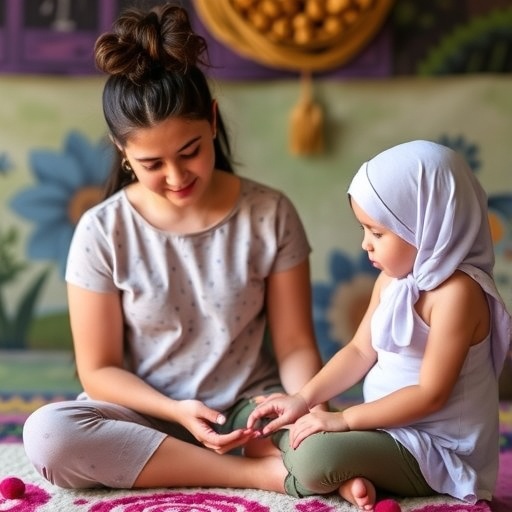In an increasingly fast-paced and demanding world, the mental well-being of young mothers is a topic that deserves focused attention. This demographic often faces unique challenges, including the pressures of motherhood, potential isolation, and the need for self-care amidst a myriad of responsibilities. Recent research, led by scholars V. Oystrick and D. Coholic, delves into the innovative approach of using arts-based mindfulness programs to enhance well-being among young mothers. Their study, set to be published in the Journal of Child and Family Studies in 2025, outlines the feasibility and potential benefits of such programs.
The arts have long been regarded as a therapeutic avenue for self-expression and emotional release. When combined with mindfulness practices, this synergy can create a powerful tool for reflection and healing. The researchers propose that arts-based mindfulness not only facilitates personal insight but also enhances emotional regulation, which is crucial for young mothers navigating both the joys and challenges of parenthood.
The study systematically examines various art forms, such as painting, music, and drama, to determine how these activities can enhance mindfulness among young mothers. Mindfulness itself, defined as the practice of being present and fully engaged in the moment, is known to reduce stress and improve mental health. Incorporating arts into this practice allows for creative expression, which can lead to deeper emotional understanding. This is particularly beneficial for young mothers, who may often feel overwhelmed and in need of outlets for their emotions.
Young mothers enrolled in the program are encouraged to explore their feelings through various artistic mediums, promoting a sense of community and shared experience. This communal aspect of the program is essential, as it fosters social connections among participants who may otherwise feel isolated. By sharing their artistic expressions, mothers can find common ground and support, which is instrumental in building resilience.
Preliminary findings from the study indicate that participants experience enhanced mood, reduced anxiety levels, and a greater sense of belonging. These outcomes align with existing literature that highlights the psychological benefits of both mindfulness practices and artistic engagement. The combination of the two appears to unlock new pathways for emotional healing, which is vital for the well-being of both mothers and their children.
An important component of the research involves measuring the long-term impacts of such a program. Initial results show promise, but Oystrick and Coholic stress the need for longitudinal studies to fully understand the sustained benefits of arts-based mindfulness practices. Their research aims to lay the groundwork for future explorations that could lead to more comprehensive programs tailored to the needs of young mothers.
The researchers emphasize the importance of tailoring these programs to meet the unique needs of participants. By conducting ongoing assessments, they can adjust the program structure in real time to ensure that it remains relevant and beneficial. This adaptability is crucial in addressing the varied experiences and backgrounds of young mothers, particularly those who may face socioeconomic barriers.
In addition to psychological benefits, the study also explores the educational potential of integrating art and mindfulness into parenting strategies. Young mothers can learn valuable skills that not only aid in their personal development but also enhance their parenting abilities. For instance, techniques learned through the program can be applied to improve interactions with their children, fostering a nurturing and supportive parent-child relationship.
Furthermore, the program also presents an opportunity for young mothers to access resources and networks that can help them navigate life’s challenges more effectively. By participating in collective opportunities for learning and art creation, mothers build a toolkit of strategies that can empower them long after the program concludes.
The implications of this research extend beyond individual benefits; they also touch on societal views regarding motherhood and mental health. By spotlighting the positive effects of creative expression and mindfulness, the study aims to challenge stigma surrounding mental health issues in parenting. It advocates for a cultural shift towards greater acceptance and support for mothers who seek help and resources for mental well-being.
As interest grows in arts-based therapy and mindfulness, Oystrick and Coholic’s work can serve as a model for similar interventions. By documenting their findings, they hope to inspire other researchers and practitioners to explore the intersection of art, mindfulness, and parenting. Future initiatives could expand these programs beyond young mothers, potentially benefiting a wider range of individuals facing mental health challenges.
For those passionate about maternal health, further exploration of these themes can offer insights into how integrated approaches may foster improved quality of life for families. The fusion of art and mindfulness presents an innovative solution that deserves further investigation and implementation.
In conclusion, Oystrick and Coholic’s research sheds light on a novel approach to enhancing the well-being of young mothers through arts-based mindfulness programs. As they prepare for publication, the implications of their study resonate through various sectors, encouraging a reevaluation of traditional therapeutic practices. Their work is a testament to the promise of creativity and mindfulness as vital components of psychological health, particularly in the journeys of young mothers as they navigate their dual roles.
With this comprehensive research, the conversation surrounding mental health supports for young mothers is set to evolve, paving the way for more inclusive and innovative approaches to well-being.
Subject of Research: Arts-based mindfulness group programs for young mothers.
Article Title: Exploring the Feasibility and Benefits of an Arts-based Mindfulness Group Program for Young Mothers.
Article References: Oystrick, V., Coholic, D. Exploring the Feasibility and Benefits of an Arts-based Mindfulness Group Program for Young Mothers. J Child Fam Stud (2025). https://doi.org/10.1007/s10826-025-03177-x
Image Credits: AI Generated
DOI:
Keywords: arts-based mindfulness, young mothers, mental health, emotional regulation, creative expression, community support, psychological well-being, parenting strategies, art therapy, mindfulness practices.




